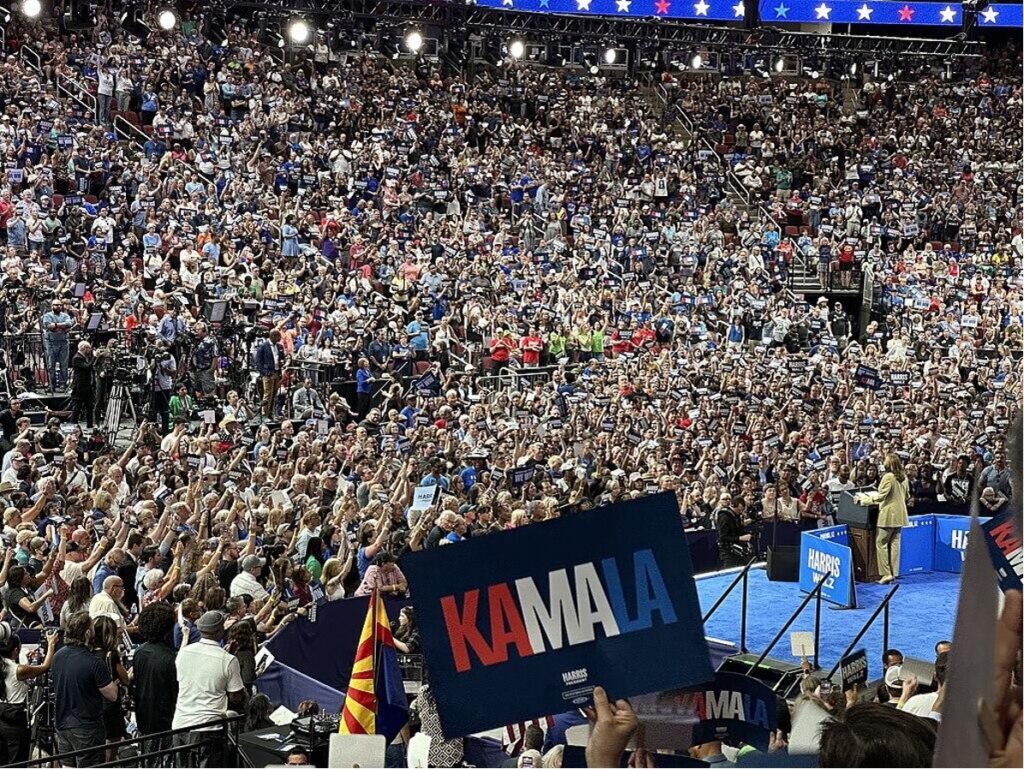
SOURCE: Wikimedia Commons.
As Ling Luo, president of Chinese Americans for Harris-Walz, explains, “The name Ho Kam Lai is a pseudonym.” According to a January 2019 report in North America’s World Journal, the name “ Ho Kam Lai” (賀錦麗) — a Cantonese pronunciation closer to “Kamala Harris” than its Mandarin counterpart, “He Jinli” — was first proposed to describe US Vice-President Kamala Harris in 2003 when she ran for San Francisco District Attorney.
San Francisco has the second-largest Chinese American population in the United States, after New York. Most politicians running for office here give themselves Chinese names, put Chinese translations on their campaign websites, and even learn a few words of Cantonese. Beginning in 2003, San Francisco’s Chinese American voters became familiar with a grinning female prosecutor named “Ho Kam Lai” (or “He Jinli”) and as Harris worked her way up the national political ladder.
Gradually, her name became more and more familiar to Chinese Americans. At the launch of the Chinese Americans for Harris Walz Campaign (哈里斯全美華裔助選團) on September 4, organizers highlighted the Chinese connection between the two Democratic candidates, Harris and Tim Walz. “We have two dragons on our ballot,” said Katherine Tai, an attorney whose parents are first-generation immigrants from Taiwan. She was referring to the fact that both Harris and Waltz were born in the Year of the Dragon, a symbol of supreme power in Chinese culture.
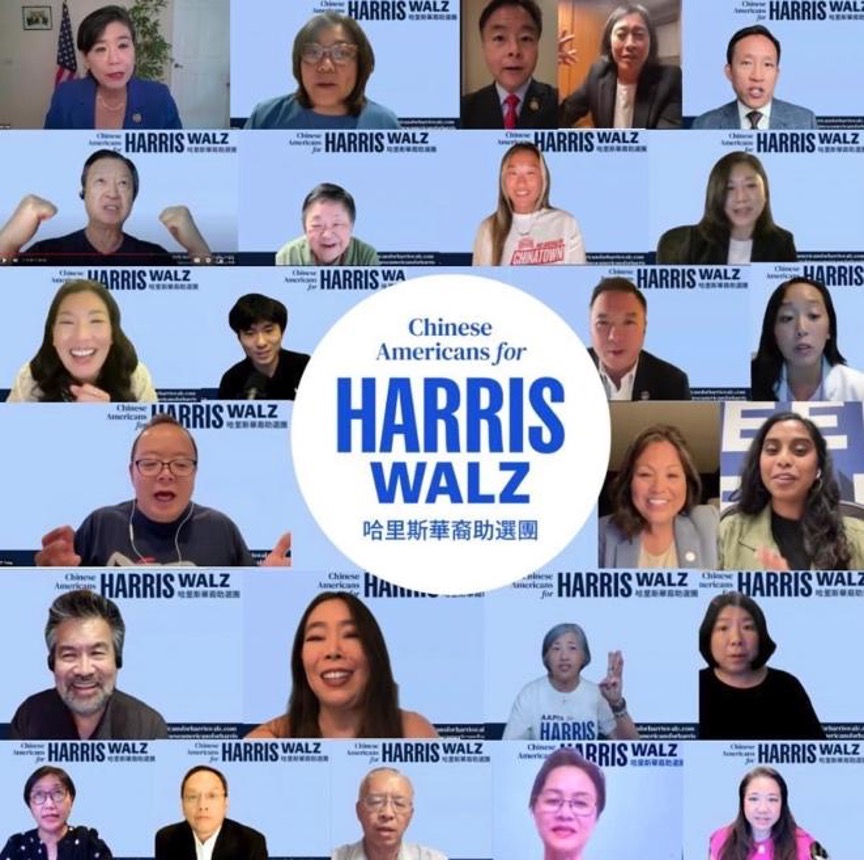
Katherine Tai was herself the first Chinese American in history to serve as the United States Trade Representative. The conference was organized by a number of Chinese American Democrats, including Congresswoman Grace Meng (孟昭文), the US representative for New York’s 6th congressional district, Congresswoman Judy Chu (趙美心), representative for California’s 28th congressional district, and Ted Lieu (劉雲平), representative for California’s 36th congressional district. The kickoff event took place on Zoom, and the screen was filled with the Asian firsts as public officials (第一個亞裔公職人員) from across the political spectrum in the US. For them, Kamala Harris, the first Asian-American vice president in history and potentially the first Asian-American president, is one of their own.
Canvassing for the Dragons
Volunteers for the Chinese Americans for Harris Walz Campaign come from across the country, and most are first-generation immigrants. Many of them have followed Ling Luo’s lead in supporting Democratic candidates over the past two decades, including Hillary Clinton, Andrew Yang (楊安澤), and Joe Biden — to name just a few.
Ling Luo says that the composition of her team is similar to the makeup of Chinese Americans, including PhDs, professors, and high-tech industry workers. This year, many immigrants have also brought their children along to take part in the campaign. Ling Luo says she recently went out canvassing door-to-door with a couple of second-generation immigrant kids who were 15 and 16. They went door to door handing out leaflets, and as they knocked on the doors of residents in swing states, they were often met with blank stares and silence, suffering the same discrimination faced by those in the first generation. “We have to fight for our rights on our own, not have them handed to us,” Ling Luo has long said. “How do we fight for them? You have to be at the table, you have to be the guest of honor at the table.”
This year, many immigrants have also brought their children along to take part in the campaign.
In the eyes of these Chinese American election volunteers, Kamala Harris is the perfect daughter of an immigrant family. “She is a successful person who has entered mainstream society, a microcosm of the American melting pot: mixed race, a former judge, an attorney general, and finally vice-president,” one volunteer said. “Her CV is what all of us Asians want to foster in our kids, and we Chinese want our next generation to be exactly like her.”
In her 2024 campaign ad “My Mother,” for which Asians are a key target audience, Vice-President Harris proudly introduces her first-generation immigrant mother, saying, “My mother taught me never to complain about injustice, but to make a difference.” The ad features a sweep of Asian faces along with words from Harris voicing her support for Asians.
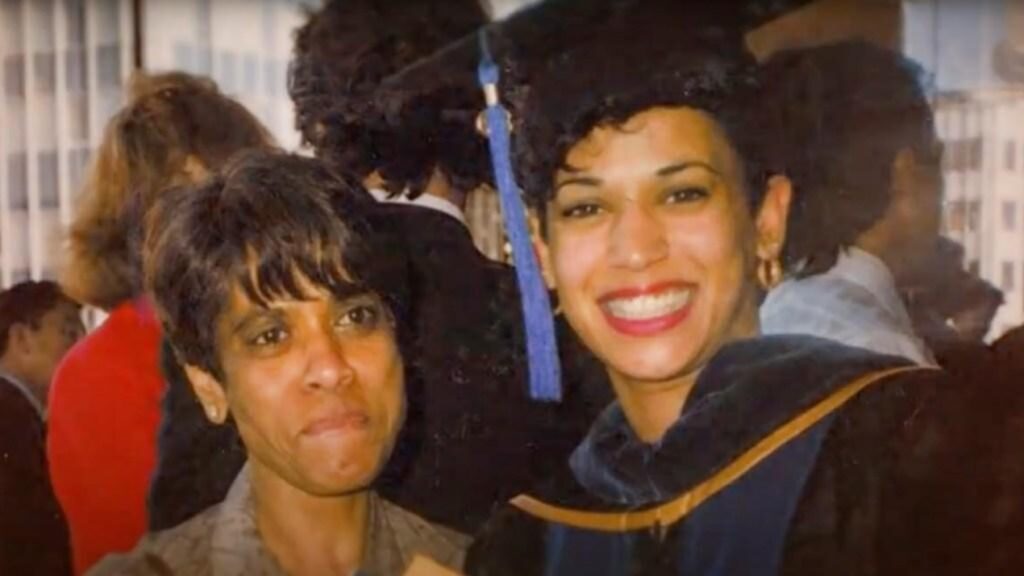
In fact, ever since Harris announced her candidacy, her campaign teams on the front lines have drawn on her ethnicity.
Her mother is a first-generation Indian immigrant and her father is a first-generation African American immigrant of Jamaican descent. The two met while attending graduate school in the US, and both later worked at US universities and settled in the United States. Coming from such a middle-class, educated ethnic minority family, Harris’s education and career have equally been marked by ethnic politics. The city of Oakland, where she was born and raised, was one of the centers of the Black civil rights movement in the US, and Howard University, which Harris attended as an undergraduate, is the most prestigious Black university in the country.
Her African American ethnicity is something that Harris has made a special effort to publicize since she entered the political arena; her Asian identity, by contrast, became better known only after she assumed the vice-presidency. She has spoken many times about how her Indian mother encouraged her to become involved in politics and social activism, and she has also explained that her name, Kamala, is the Sanskrit name for the lotus flower. Andrew Peng, a spokesman for the Harris campaign, said the team has dedicated an unprecedented level of resources to target Asian voters. The Democratic National Convention (DNC), he says, has spent heavily on paid media, translation work and event scheduling. The team now has three full-time staffers focused on Asian voters, as well as additional staffers addressing Asian voters in key states.
In the US, being Asian is not so much about ethnic identity as it describes a broad spectrum that includes immigrants from places as wide-ranging as the Philippines and South Korea, the Pacific Islands and India. The composition of the Chinese American community is especially complex, as even those of Chinese ancestry who have citizenship will have different countries and places of origin, languages, generations, classes, and so on.
Even though the “Harris Briefing” (哈里斯簡報) from the Harris Campaign has been published in both simplified and traditional Chinese, many local campaigners will make sure to add their own Chinese translations to their campaign materials and activities. Still, there are a significant number of Chinese Americans who do not speak English, and who might not have access to the “Harris Briefing” or to her campaign ads like “My Mother.” They get their information instead from Chinese-language platforms. And on these platforms the three characters for Harris, “He Jinli,” give rise to a far more contentious and contradictory discursive space.
Undermining the Perfect Immigrant Daughter
As we observed and analyzed simplified Chinese posts on X, WeChat Channels, and Douyin (TikTok), where discussions about Harris were concentrated, we found that Harris’s immigrant status and the life experiences of her parents remain important axes that “define” her on this side of the information ecosystem. Interestingly, however, we found that the very narrative that her supporters have tried to put front and center — that she is the exemplary daughter of an immigrant family — is entirely undermined in this ecosystem.
In the vast majority of narratives we observed, the story portrayed was precisely the opposite: Harris is a disgrace to her immigrant family owing to her failure to excel, and to her alleged indiscretions in her private life. At the same time, the question of Harris’s femininity adds a further layer of complexity to these discussions. What does it mean to be the good daughter of immigrants? What makes a good politician? What makes a good woman?
We found that the very narrative that her supporters have tried to put front and center — that she is the exemplary daughter of an immigrant family — is entirely undermined in this ecosystem.
For Mandarin speakers who use simplified characters in the US, if you are an X user, there is a good chance you will access election information sites in your native language.
In this world, Harris is known by another name — wu ji (烏雞), or “the black chicken” Meanwhile, her running mate, Minnesota Governor Tim Waltz, is called “Bai Feng,” or “white phoenix.” Taken together, the first characters in these nicknames, “Wu” and “Bai,” allude to the fact the candidates are darker and lighter-skinned. Together, the two names also come very close to “Wuji Baifeng Wan,” the name of a proprietary Chinese medicine that claims to be “an all-purpose gynecological treatment.” To a certain extent, this coincides with Trump and his supporters calling Walz a “tampon man,” emphasizing the femininity of the Harris-Walz duo, while at the same time drawing the reader’s imagination to the female body and sexual organs. The word “ji” (雞), the second character in this name for Harris, is even more obscene, directly linking it to the Chinese words for “chicken” and its homophone “prostitute” (妓).
With the limited number of words that users can post on X, it is difficult to discuss the election and politics in a more in-depth way. More often than not, users rush to declare their positions and attack politicians and parties they dislike or even despise. At the same time, X is a multilingual platform where users can easily forward posts, videos and images from English-language users — allowing them to quickly synchronize and localize English messages that share their stance. This often results in sparseness of substance and originality in the political views found in simplified Chinese, while emotion runs rampant.
When it comes to specifics about Harris, Chinese-language posts tend to be very sparse in terms of real information content. A portion of the posts are simply re-posts of opinion pieces, screenshots, cartoons, and other content from English-language accounts, while the Chinese comments added are at once implicit and quite explicit. They are obscure in the sense that any observer unfamiliar with labels like “the black chicken” (烏雞), “goose giblets” (鵝雜), “Harry crap” (哈里屎), “tampon man” (棉條男), “white duck” (白鴨), “yellow left” (黃左), “mackerel” (鮁魚), and “fox” (狐狸), will imagine these are just some form of local dialect, or a secret code.
These words are extremely derogatory to both Harris and Walz. The term “goose giblets,” for example, is a derivation of the slang term “giblets” (杂碎), which can suggest someone is trash. Its pronunciation in Chinese somewhat resembles “Walz,” and so in this case it is used to insult the Democrats’ candidate for vice president. The term “yellow left,” derived from the term “white left” (not unlike the insult “liberal snowflake”), is an insult directed online at Chinese liberals.
Get past these odd words, though, and the messages inside these posts are the most basic and direct insults, ridicule and propaganda. A few are slightly more measured, like, “to reduce taxes and raise revenues, elect Trump; to increase taxes and get poorer, elect the cockerel.” But many are unmistakable personal and racist attacks: “If Columbus hadn’t discovered the New World, then there wouldn’t be a black chicken like her! Her father would have inherited his ancestral property and kept slaves in Jamaica, and her mother would have self-immolated and died for her husband.”
This combination of agitated emotion and sparse information connects with users in particular who enjoy tussling about politics on X. But whether in China or the US, the preferred platform for Chinese users is not X but WeChat. With its high number of downloads and daily users, WeChat continues to dominate the Chinese information ecosystem — regardless of whether this is in group chats or on WeChat Channels. Nor should Douyin, Tiktok and other short-form video platforms be underestimated.

WeChat’s Channels includes a wide array of traditional media from mainland China as well as a large number of self-media (自媒體) from both inside and outside of China. The US election is an important news event of the year, and the channels of serious media such as Shanghai’s The Paper (澎湃新聞), Phoenix TV (鳳凰衛視), and China Newsweekly (中國新聞週刊) have published a slew of reports.
Far more popular within WeChat Moments and chat groups, however, are the posts of various self-media in China and North America. These include accounts that offer more original content for mass audiences, including “Country Road America” (陌上美國), and “Uncle Brit” (英倫大叔). There are also consumer accounts targeting specific regions, offering tips and guides for certain cities or states in North America with large Chinese populations. These accounts have a low capacity for original text output, and so rely on copying and reposting text, translations, and images from other sources. [NOTE: The account “Country Road America” plays on the phrase “a path in the fields (陌上), which evokes a sense of nostalgia for rural living or a desire to return to nature, away from the glamor of the city.]
In the small world of WeChat Moments, chat groups, and WeChat Channels, text and image content has a harder time surviving against platform censorship and users habits — in stark contrast to X, where abusive language, and content about politics, democracy, and elections can thrive. In these WeChat spaces, if posts hope to attract thousands, tens of thousands, or even hundreds of thousands of views, they must at least appear more reasonable, be more engaging, and also more informative. At the same time, they must include more text, pictures, and videos in a single post. In this environment, the overtly racist label “black chicken” vanishes altogether, replaced by “Three Smiles Harris (哈三笑), which suggests Harris is frivolous and incompetent [NOTE: This is related to the term “two laughs” (二哈), which in Chinese can mean “silly”.]
Videos of Harris beaming during a number of speeches and rallies have been posted to public channels alongside text in ways that are meant to demonstrate her frivolous nature.
This phrase along with others like “Big Mouth Harris” (哈大嘴), and “Three Dusty Smiles” (風塵三笑) refer to Harris’s habit of laughing [NOTE: The term “wind and dust (风尘 ) is a euphemism in Chinese for prostitution]. Videos of Harris beaming during a number of speeches and rallies have been posted to public channels alongside text in ways that are meant to demonstrate her frivolous nature, to suggest that she lacks the courage and capability a real politician should have, and to prove she is capable only of stupidly grinning. In some cases, these remarks grow even more offensive, suggesting that Harris’s smiles are a form of flirtation — that they suggest she has “slept her way to the top” (往上睡), as some write.
The WeChat channel “Country Road America” focuses on American politics. Recent posts on the channel include dozens written about Harris, some of which are short videos with just a few sentences, earning little more than a few hundred views, and some that have tens or hundreds of thousands of views. Quite a number of these posts are about Harris as a woman. Several, posted under the name “Amber Kite” (琥珀風箏), go on and on with stories alleging Harris has used sex for career advancement:
“When she was just in her 20s she became the mistress of a 60 year old married man (my dad isn’t even 31 years older than me, by the way) as she was looking for the first pot of money in politics from a California establishment figure who was a married man a generation older — it’s just amazing that almost half of Americans tout her as a ‘feminist icon.’” — The Democrats are about to be devoured! The leaders have hand-picked themselves. A descendants of a master poses as a member of the slave class, and a mistress represents women’s rights.
. . . . .
“Brown himself admitted that he had helped Harris get two high-paying jobs in the California state government, and that she made hundreds of thousands of dollars in revenue in a few years, and that was 30 years ago. She had no background in the field, and Brown gave her a fancy car, the California version of the BMW.” — The First Bucket of Money for Harris, California’s BMW Woman. [NOTE: “BMW Woman” was a contestant on a Chinese dating show a decade ago, who famously said: “I’d rather cry in a BMW than laugh on the back of a bicycle.” She became a symbol of frivolity.]
“Amber Kite” is the founder of this channel, as well as related accounts on X, Youtube and Telegram. In an interview with Epoch Times last year, she introduced herself as a person who went to the United States for her doctoral studies, stayed there to work, got married and had children. She said that she had changed her political orientation in the United States, from “believing that personal success and development is the most important thing, and that my family and children would drag me down and make me lose my youth too early” to believing that “true feminism lies [in realizing] ‘motherhood is the key to strength,’ and that abortion is not feminism, but instead fosters a casual sex life and encourages women to be vindictive, and to hate their own flesh and blood, which is a kind of anti-humanistic brainwashing.”
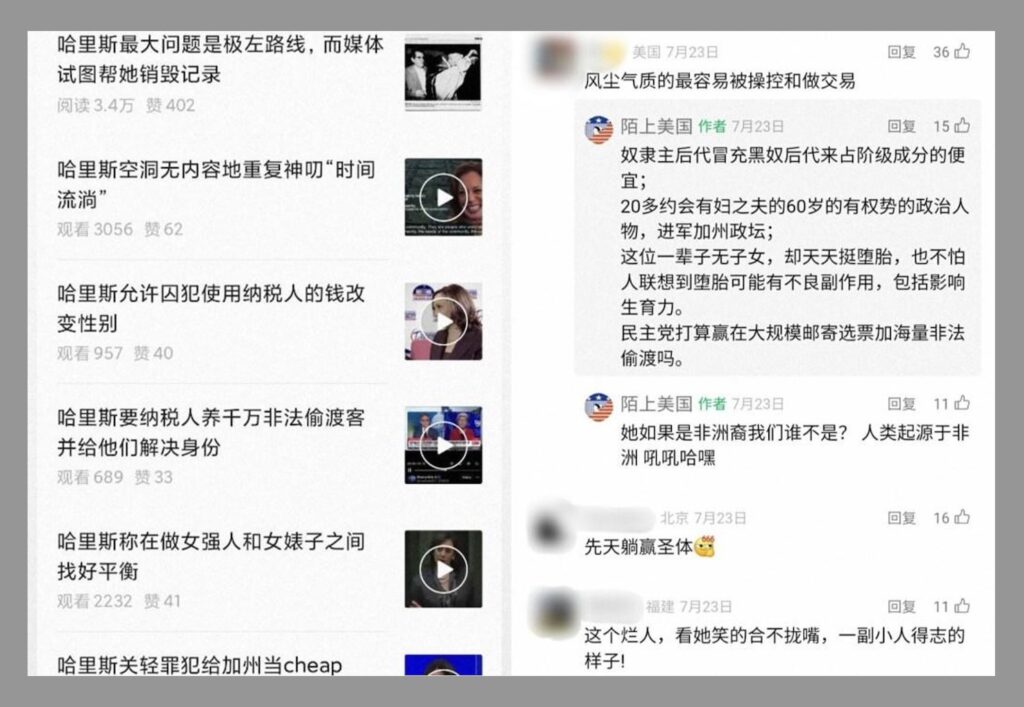
Another contributor to this account, “Yamei’s Way” (雅美之途), is a doctor of science who went to the United States to study and stayed behind to work. His attacks on Harris are even more wide-ranging, covering everything from her parents to her lack of children, from her ethnicity to her education and career. He is especially concerned about the racial and class identity of Harris’s family. On the one hand, he feels her family is not black enough, and on the other it angers him that she attended Howard University (the top-ranking black university in the United States), which is too black, he says, to be considered a decent school.
“Harris’s immigrant father was an academic elite with European blood on his side. She has the genes of a Caribbean slave owner, which is almost exclusively mixed. Her mother belonged to an elite group of Indian-educated people who came to the US for their doctorates, and many Indians can be classified as Caucasian. This, coupled with the effectiveness of skin color protection products, makes Harris almost invisible as a black person, but she took advantage of this racial categorization . . . . Despite affirmative action protections and coming from a family of academic elites with two PhD’s, she only went to Howard University in DC, not to be confused with Harvard, please.” –Why are California politicians So Awful? Talking About Presidential Candidate Harris.
In the eyes of “Yamei’s Way,” the fact that she not only failed to get into an elite school, but also failed to get married and have children at the right age, makes her a negative role model that American families, including those of Chinese descent, should beware of.
“How is it miserable for Harris to have parents with double PhD’s from the prestigious University of California Berkeley? Her father was a longtime Stanford professor, and even after they divorced there were generous child support payments. Her mother didn’t make it in the US or Canada even though she had a Berkeley PhD.”
“Harris, who wasn’t a good student herself, took advantage of her situation. She played around and didn’t marry until she was 50, missing her window to have children. If young women follow her example, that’s the recipe for a US population crash.”
These two writers frequently use labels like “Three Dusty Smiles” (風塵三笑) and “Three Smiles Harris” (哈三笑) to talk about Kamala Harris, and these labels are often used on other channels, as well as on marketing channels. In these posts, her love of laughter exposes her “dusty” (風塵) past, this being a reference in Chinese to prostitution and the ungrounded life. The boyfriends she has dated, the marriages she has ended, and the childlessness of her present state make her laughter more and more annoying to these writers. How is it possible that she can laugh!
Selling the Sensational
On short video platforms, the traffic-generating hot topic of Harris and her supposed shortcomings is naturally not to be missed. Although some video producers are based in the US, there is far less Harris-related content on Tiktok than on Douyin, which is a more Chinese community. Douyin, by contrast, is more likely to have videos targeting mainland Chinese and North American Chinese who gravitate toward Chinese-language content. In terms of audience, these videos are aimed more at election spectators who are “eating watermelon” — meaning that they gossip about things that have no bearing on their lives. Internet influencers focus on the absurdity and strangeness of American politics, tossing in all kinds of racist and sexist phrases.
Enter the word “Harris” on Douyin, the relevant searches displayed by the system are “Harris full-body photo,” “Harris stunning dance,” “Harris photoshoot,” “Harris explicit video.” Open these videos and you find invariably that the content replays the idea that Harris rose through the ranks because of her good looks, by being a mistress and currying favor with grassroots African American voters — without any of the promised “explicit” elements.
These short videos are generally quite short, from a few seconds to a minute, and are basically slideshows of Harris photos from childhood to adulthood, with no logic in the narration. The videos are simple, crude and highly homogeneous. Their authors are not interested in making political observations about the United States, but rather in generating buzz and traffic. But it just so happens that because of the nature of Douyin platform and the composition of its users, videos like these are captured by the algorithm and favored in search results.
There are also video creators on Douyin with millions of followers who produce content with “Harris” (哈里斯) as the main focus, such as “Li Sanjin Watching the World” (李三金看世界), which has more than 3.6 million followers. Similar to “Country Road America,” this is an all-platform account (全平台帳號), and in addition to Douyin, identical content uploaded by the host can be found on Youtube, Xiaohongshu, and Bilibili. The owner of the account is active in the United States, and rose to popularity in recent years by displaying the “misery” of Americans during the pandemic.
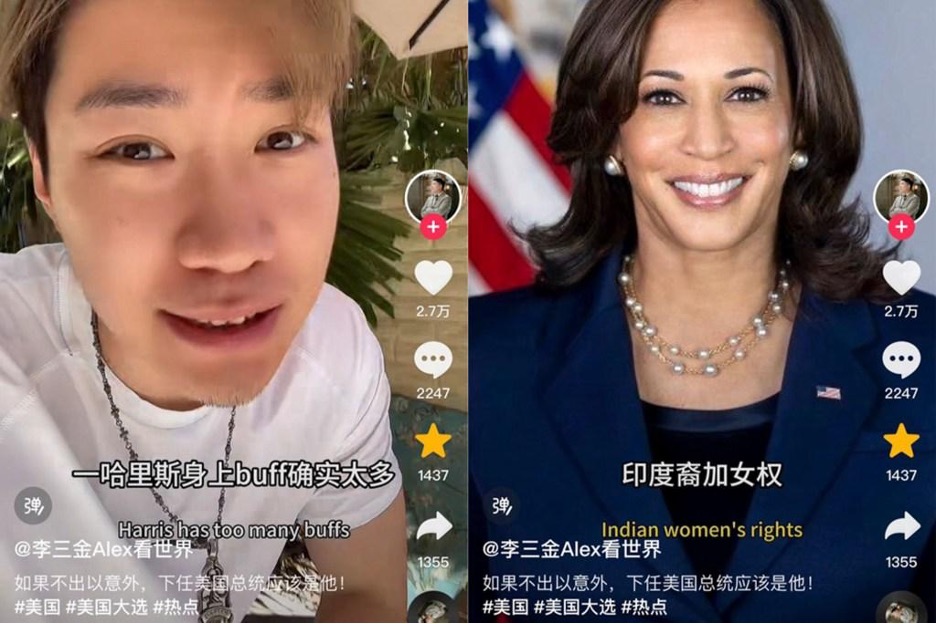
The pandemic now passed, the host now regularly uploads videos about social life in the United States, gender politics, urban crime rates, and so on — mainly comparing the strengths and weaknesses of China and the US, with China routinely coming out on top. He sometimes uploads videos praising China and the prosperous lives to be had there. Although his fan base on other social media platforms is much smaller than that of Douyin, he has earned a fair amount of traffic on sites such as Bilibili by exploring popular topics related to the presidential election.
Like the Harris-related videos produced by Li Sanjin, this type of content aimed at Douyin users prefers to use the United States to highlight China’s advantages. Unlike the US, for example, China does not have so many feminists who are unwilling to have children. Or China does not have the “zero-dollar shopping” phenomenon — meaning the raiding of businesses by black rioters, a trend of fake news on Chinese-language social media — that they absurdly allege was caused single-handedly by Kamala Harris. Her Asian identity in these videos is narrowed down to “Indian,” which in turn triggers a series of discriminatory stereotypes about Indians. Or the discrimination centers on failed women who are unmarried and childless, especially when contrasted with Trump’s daughter, Ivanka, the Goddess of America, a woman who has money, children and a career.
In contrast to text and image-based platforms, short-form video content rarely has the patience or ability to present a rational argument. Hosts prefer instead to snidely chat with their audience about the ridiculousness of “the pretty country” — a play on words that satirizes the Chinese name for America, literally “beautiful country” — or try to commiserate with Chinese in the US about their humiliating experiences as second-class citizens.
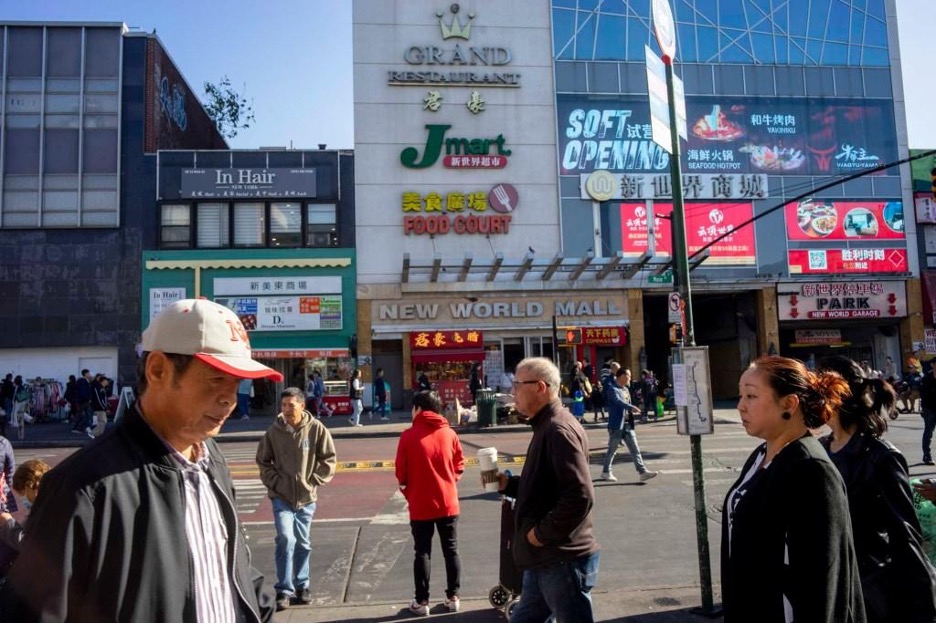
According to a survey conducted by the Pew Research Center, the Asian-American population currently exceeds 24 million, accounting for 7 percent of the total population. Among them, there are more than 4.7 million Chinese, accounting for nearly 20 percent of the Asian population. This is obviously an important constituency for politicians. But it is worth noting that not every Chinese American can vote. According to the official US Census, as of 2022, fewer than 60 percent of the Chinese American population will be eligible to vote — those who are 18 years of age or older and who were born as US citizens or became US citizens by naturalization.
Of these, 40 percent of Chinese Americans are second, third and fourth-generation immigrants born in the US. The vast majority of them were raised in and live in the US, speak English as their mother tongue, and do not frequent the social media and information sources commonly used by PRC nationals and first-generation Chinese immigrants. The remaining 60 percent include Chinese American populations from Taiwan, Hong Kong, and Southeast Asian countries, as well as those who self-identify as multiracial.
When we unravel these numbers, we see that the proportion of first-generation immigrants from China who can vote this year is not high, and because this community does not readily speak English, the official publicity materials released by the two presidential campaigns generally do not reach them. What they do use more often are WeChat, Douyin and X, where simplified Chinese is the main language of communication.
In fact, as early as the 2000s, anthropologist Arjun Appadurai observed that modern globalization has weakened the role of national borders as an impediment to capital, talent, culture, and media. Fast-forward to 2020, and the situation has become even more complex, with media and information not only crossing boundaries more frequently and in larger quantities, but also creating cocoons of information due to algorithms, regulation, and other factors.
All of this means that within the same city, the same neighborhood — and even under the same roof —there is a deep and abiding tension over what the Democratic Party ticket under Kamala Harris means. For some, Harris is the perfect immigrant daughter. For others, meanwhile, gnashing their teeth online and nursing deeply racist animosities, Harris and Walz are, like the “Wuji Baifeng Wan” gynecological remedy used so viciously to satirize the pair, a bitter black and white concoction.
This report was initially published in Chinese at Initium Media. The original version can be found here.

